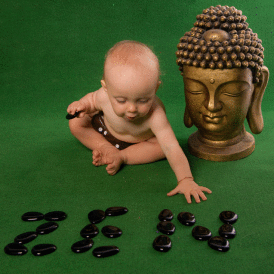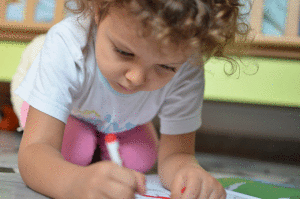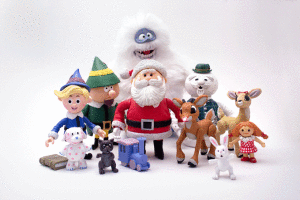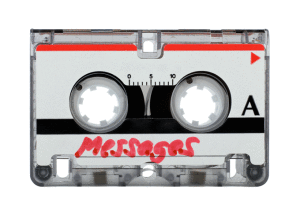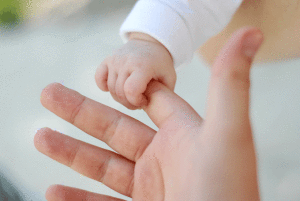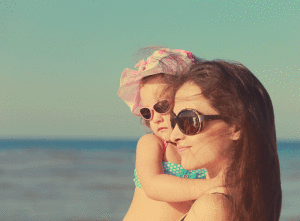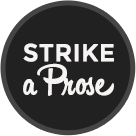My daughter’s preschool teacher is talking about an incident at school. Eva might have ripped her twin sister, Rose’s, paper. It’s possible she lied about it. Her construction paper farm lacked detail, coherence. Like her letters. Like her stick figures. I’m fond of her stick figures. Their arms and legs come right out of their heads, like an M&M’s mascot. They’ve recently acquired hair that sticks straight up, giving them a punk rock element that tickles me. But I can feel where this conversation is going. I’ve been in the teacher’s position many times. I’ve gently given parents the evidence, the careful presentation of facts, followed by the recommendation. In this case an Occupational Therapy evaluation.
For those of you born around 1970, OT wasn’t really a thing when we were growing up. It addresses a wide range of concerns, including: sensory integration, fine and gross motor skills, and self-regulation. It’s a recommendation I made several times when I taught second and third grade. For Eva, who’s just started kindergarten, it could offer the help she needs to make the transition to elementary school.
But in spite of the perspective my work in education gives me, when I call to schedule my daughter’s evaluation, and the woman uses the phrase ‘developmental delays,’ I experience a brief, volcanic rage. I want to smack her face through the phone. I want to say something devastating and make her take it back. “Maybe,” I answer, my voice shaking so little that I think only I can tell.
Eva and I have to drive an hour to get to Oakland, the closest place on our insurance plan that has a pediatric OT center. The therapist is warm, pleasant. However, she keeps talking about Eva like she isn’t there as she tries to excavate the details of her limitations. I include Eva in the conversation. “Eva, do you find forks or spoons more difficult?” “Forks.” She answers. She watches me watch her over the course of the evaluation. It’s hard to look at her using scissors. Her fingers seem at risk. But I smile at her every time she catches my eye. She smiles back. Her smiles illuminate her face. They would possibly illuminate black holes.
After the evaluation, Eva and I have burgers and milkshakes at Fenton’s, an old-fashioned style ice cream parlor. “Do you have any questions?” I ask her. Hoping to crack through, find out what she’s thinking about all of this. “Can I have a cherry on my milkshake?” She asks.
I need coffee before we do the drive back to our small town. We walk hand in hand into a black and chrome hipster coffee shop a little ways up the street. The place is filled with vintage denim and piercings. People act like they’ve never seen a kid. They move away from us with sidelong glances as we make our way to the back of the line. While we’re waiting, I see Eva watching the two guys in front of us. They’re in their twenties, wearing leather jackets, boots, complicated hairstyles. She catches the eye of the guy closest to her.
“I like the pictures on your arms,” Eva says, then she laughs at herself a little. “I don’t mean pictures, I mean tattoos. I know tattoos for a long time. My daddy has one.”
Tattoo guy looks at his friend then back at Eva. “Cool,” he finally offers.
“Oh!” says Eva undeterred, “I have tattoos.” The guy’s eyes widen a little. She pulls up both sleeves of her sweater dress. “See!”
On her right arm is a washable tattoo of Anna and Elsa embracing. On her other arm is a glitter tattoo of a heart.
“Nice,” the guy says warming, “why’d you choose that?” He asks, pointing to the heart.
“Because it’s love!” She answers with the little jump she does when she’s happy. She’s getting to him, I can see it.
As tattoo guy is walking out the door, he looks back and says, “Bye,”
“Eva!” She offers, thinking he’s waiting for her name. “What’s yours?”
“Max,” He says, “Bye, Eva.” He gives a small wave, and then, he actually smiles.
I experience a moment of raw pride in my daughter who has been driven across two counties to spend an hour doing things that are a struggle for her, and she has come through it all with her native sweetness and social ease in tact.
I realize what I’m really afraid of is that school won’t appreciate all of the things that make my child so unique. I’ve watched her sit in the backyard for an age listening to the songs of different birds. Sometimes she sings back. I’ve watched her study a ladybug as she gently encouraged it to crawl down one arm and then up the other. She does a dead-on impression of a minion from Despicable Me. Her belly laughs make everyone in earshot laugh, even if they don’t know what’s so funny. When she heard a baby crying at swim class the other day, she stopped in her tracks, saying, “Oh, poor little thing, I wish I could give her a cuddle.” That kind of sympathy pours out of her daily. There aren’t boxes to check for any of this stuff.
Back at the car I put Eva in her carseat. I tell her, “I’m so proud of you.”
“Why?” She asks.
“Because today was rough and you’re being such a good sport. You’re so fun and lovely even when things are hard.”
“Oh. OK. Thanks, mama, but you should know your coffee is on the car.”
I look out and see my cup of coffee on the hood of the car. I would’ve driven away with it if she hadn’t pointed it out.
Looking at her in the review mirror as we drive I study her face, noting the constellation of copper freckles across her nose and cheeks the same color as her hair. She’s looking out into the distance, sleepy-eyed and still. For the first time it occurs to me that maybe she isn’t hiding anything. Maybe none of this worries her all that much. I think how hard it is to really know anyone, even the people we love the most.
“I’d be lost without you,” I tell her in the review mirror, watching thoughts cross her unguarded face like weather.
One of those killer smiles lights her face and, for a passing moment, she looks much older than her 4-year-old self. For a second I see her face as it will be when she’s 13 or even 20. “I know,” she answers, “you would be.”


